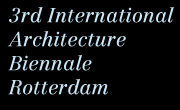| PowerNotes #06 Hyper Power: Keller Easterling on Dubai | |
In her essay in the book Visionary Power - Producing the Contemporary City Keller Easterling responds to the theme of ‘Corporate Cities/Global Capital'. On 29 May she gave a lecture on Dubai in the PowerLounge, followed by a dialogue with Michaël Zeeman (a Dutch writer well known for his television show Zeeman and Books) . | |
Rotterdam - 29 May 2007
A steadily increasing proportion of international trade is taking place in administrative zones that are outside the normal regulatory regime. More and more often, multinational corporations with offices in these zones manipulate local authorities in order to create the most favourable conditions for themselves. The host country of these zones also derives advantages from this. The ‘Corporate City', according to Easterling, is a harbinger of the twenty-first-century city. It is composed of zones or thematic enclaves, with names that evoke familiar images, such as Dubai Maritime City, Dubai Humanitarian City, Dubai Outsourcing Zone, Dubai Textile city, and so on. Inside these zones, undesirable elements are excluded. At the same time, controversial activities are usually taking place in the realm of environmental standards, labour conditions, public space or political representation. The Corporate City has its own rules; it is outside jurisprudence. It is an apolitical free port in the tradition of free ports and pirates' nests. As an urban paradigm, it is a pre-programmed city with inexhaustible possibilities, precisely because of the lack of bureaucracy. The forces behind the Corporate City play out outside the usual political arena are not bound by left-wing or right-wing morality. Easterling calls this ‘extrastatecraft'. In her lecture on 29 May, using Dubai as an illustration, Keller Easterling showed what the role of architecture is within the Corporate City, where it is defined by global capital. Dubai, the capital of one of the seven emirates that together form the United Arab Emirates, is a dictatorial state ruled by Sheikh Mohammed bin Rashid Al Maktoum. The sheikh uses the media as a political instrument; the city is marketed as a fairy tale, where life is sublime and problem-free. This desert city too is ruled by economic forces rather than by political forces. This is a global phenomenon: private investors are increasingly determining what form the living environment takes. The architecture that results from this consists of visual spectacle screaming for attention. In the dialogue with Michaël Zeeman, an analogy was drawn to the ostentatious imagery of the Third Reich's KdF-Seebades Rügen and to Walt Disney's Magic Kingdom. When Zeeman asked whether these signals called for alarm, Easterling replied cautiously that, in addition to urgency, opportunities also present themselves: ‘You must be too smart to be right.' The question is how architects can deal with these forces. Or are architects out of the loop? Easterling thinks that architecture, in fact, as a more or less independent player, is capable of exerting a certain influence and initiating change.
Entertainment in Dubai
Keller Easterling is an architect and writer from New York. Her book Enduring Innocence: Global Architecture and its Political Masquerades (MIT, 2005) researches familiar spatial products that have landed in difficult or hyperbolic political situations around the world. At the moment she works on the book Extrastatecraft, which examines global infrastructure networks as a medium of global polity. Easterling is an associate professor at Yale University School of Architecture who received her Masters of Architecture from Princeton University.
|
POWER -
Producing the Contemporary City
24 May - 2 September 2007
Producing the Contemporary City
24 May - 2 September 2007
Nederlands | English
"The only maxim of art is not to be imperial. This means today: it does not have to be democratic, if democracy implies confirmity with the imperial idea of political liberty." (Alain Badiou, 2005)


